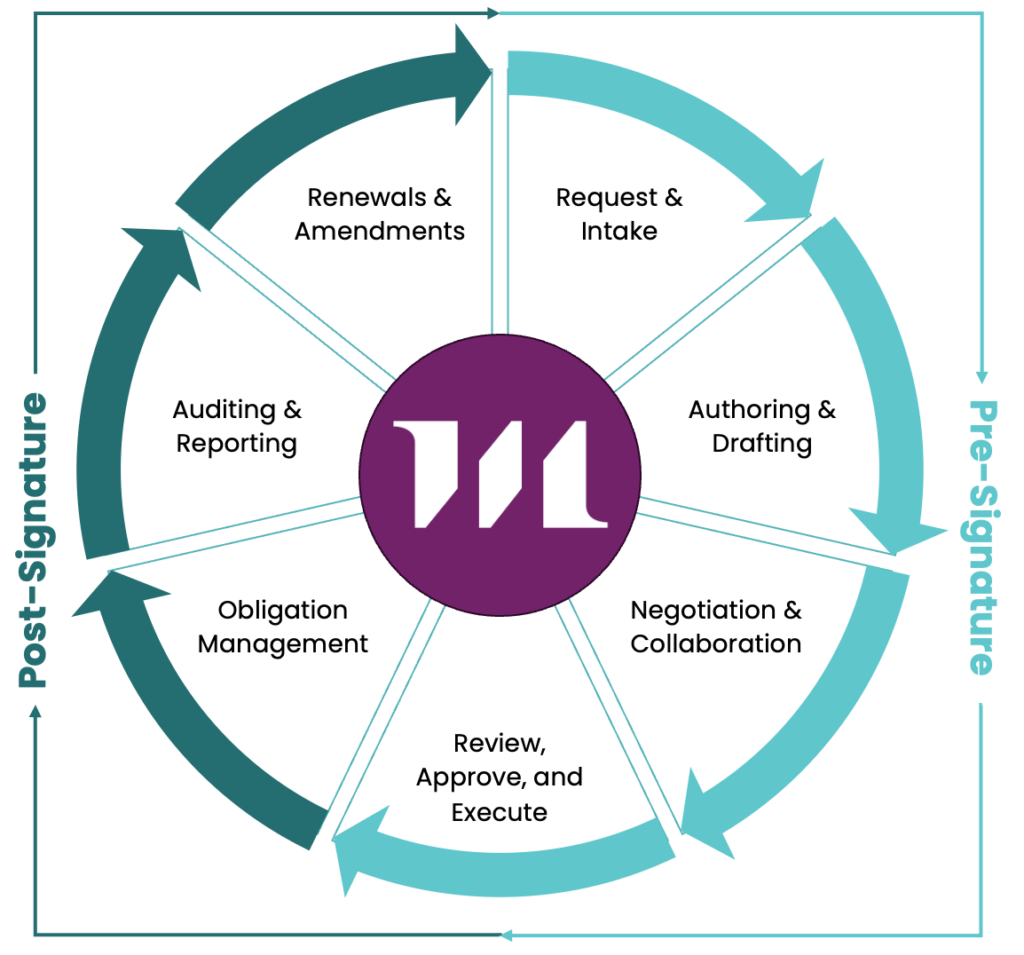What is an Executed Contract? – Definition & Examples
An almost incalculable number of contracts are signed every year by business partners all over the world. It is no coincidence that almost a third of all employees worldwide work in contract management. But what exactly is the meaning of an executed contract? How do they affect the success of your business? In this article, we get to the bottom of this topic and show that these agreements are not just legal formalities, but the engines that drive companies forward.Executed Contract Definition
Executed Contract Definition
An executed contract is a legally binding agreement concluded and signed by all necessary parties. This crucial stage signifies the transition from negotiation to enforcement, marking the agreement as effective and enforceable.
The term carries dual significance:
- It denotes a contract that has been fully endorsed by signatures.
- It represents an enforceable obligation.
This is the core of how we define an executed contract, which encompasses the transition of the agreement from a proposal to a legally binding document.
Partially Executed vs. Fully Executed Contract – Key Differences
It is important to distinguish between fully executed contracts and partially executed contracts, as both involve completely different types of contract management tasks.
| Aspect | Fully Executed Contract | Partially Executed Contract |
| Completion Status | All parties have signed, and every obligation in the contract has been fulfilled. The contract is considered complete. | Some, but not all, obligations have been met. The contract remains active with ongoing responsibilities or actions yet to be completed by the involved parties. |
| Legal Effectiveness | The contract is legally binding and enforceable in its entirety. Every term and condition is now applicable to all signatories. | The contract is legally binding, but not all provisions may be enforceable yet, as certain conditions or terms are pending completion. |
| Obligations and Responsibilities | No further actions are required by any party; the contract has reached its conclusion. | Ongoing obligations and responsibilities exist. Parties are expected to continue fulfilling their duties to achieve full execution. |
| Execution and Effective Dates | The execution date (when the contract is signed) often coincides with the completion of all obligations. The effective date, the point when the contract’s terms start applying, usually precedes completion. | The execution date marks the beginning of the contract, but the effective date might vary, depending on the fulfillment of specific conditions within the contract. |
Executed Contract – Legal Implications
A concluded contract has far-reaching legal implications that relate to both the binding nature of the agreement and the enforceability of its provisions. When the parties enter into a contract, they are legally bound to honor the commitments made therein. This enforceability is a critical aspect of what constitutes an executed contract.
Once the contract is signed by all parties involved, it goes from being a mere agreement to a binding obligation that is enforceable in court. This legally binding nature ensures that all parties are responsible for fulfilling their respective parts of the agreement, as any deviation or breach can have legal consequences.
Overcoming Legal Challenges Through Digital Solutions
Digital solutions have become valuable tools for legal compliance and effective risk management. These technologies facilitate the tracking of contractual obligations, deadlines, and responsibilities, improving the ability to meet contract terms.
They provide insight into potential legal risks and enable parties to proactively address issues before they escalate into significant legal challenges. Integrating technology into contract management not only streamlines the process but also strengthens the legally binding nature of the contracts entered into, making them more robust and easier to manage.
Case Studies: Executed Contracts in Various Industries
Executed contracts are at work in every corner of the business world and characterize transactions and partnerships in various industries. Let’s look at a few real-life examples to see how these agreements come to life.
Executed Contracts in the Construction Industry
In the construction sector, a common scenario involves an agreement between a property developer and a construction company. Upon executing the contract, the construction company commits to completing a building project within a certain timeframe, while the developer commits to regular payments. The clarity and precision of the terms in such contracts are critical to the success of the project. Modern contract management systems here prove invaluable, meticulously tracking project milestones, payment schedules, and adherence to timelines.
Executed Contract in IT
In the technology industry, software license agreements are great examples. These executed contracts between software developers and end-users set out the terms and conditions for the use of the software. These agreements are essential for protecting intellectual property rights and ensuring compliance with license terms. Contract management tools play a critical role in monitoring these contracts and ensuring that they are renewed on time and that license conditions are met.
Event Industry Executed Contract
The event industry also relies heavily on executed contracts, particularly in organizing large-scale events. The agreements between event organizers and service providers, such as catering companies or entertainers, are very detailed and define the service specifications and payment terms. Contract management systems may provide great support to both parties as they efficiently manage multiple contracts at the same time, ensuring that obligations and key deadlines are met.
The Process of Contract Execution
The execution of a contract is a precise process that requires attention to detail and an understanding of the legal requirements. It begins with the drafting phase, in which the terms are drawn up and negotiated. Once the parties have reached an agreement, the contract is reviewed to ensure that it is clear and that both parties understand their obligations. The next step is signing, where the contract is formally executed and mutual agreement to the terms is signaled.

However, execution is not the endpoint. Managing a contract post-signature involves monitoring the fulfillment of obligations, handling amendments, and staying audit-ready. At this stage, each milestone, payment deadline, and renewal clause is monitored to ensure that the terms of the contract are being met and fulfilled.
The Role of CLM Software in Executing Contracts
Throughout the execution phase, Contract Lifecycle Management (CLM) software is an indispensable ally. Such platforms improve the process by automating the flow from creation to completion. They help to create contracts using ready-made templates and ensure consistency and compliance with legal standards. During negotiations, contract management software tools facilitate seamless collaboration and even integrate third-party paper to consolidate changes and terms without delay.
Once the contract is ready for signatures, CLM software offers digital signature solutions that not only speed up the process but also provide secure and verifiable signatures, making location restrictions obsolete. Once executed, these systems are invaluable for monitoring compliance with contract terms, providing reminders of key deadlines, and providing insight through reporting capabilities.
The Role of a CLM within the Organization
Here’s how different functions within an organization can leverage a CLM system:
- Sales teams: Accelerate the sales cycle from contract creation to closure, ensuring seamless collaboration and faster deal finalization.
- Legal departments: Increase efficiency by cutting down legal contracting approval times and elevating the legal team from operational to strategic roles.
- Procurement professionals: Improve procurement contract management, monitor performance, and ensure compliance with purchasing agreements.
- Finance: Manage financial terms effectively to avoid penalties, ensure timely payments, and align contract objectives with financial targets.
Key Strategies for Effective Contract Execution
When executing contracts, the application of certain best practices can significantly increase efficiency and accuracy. These practices, which are subtly supported by modern CLM systems, include:
- Clear terms and conditions: Use structured templates and predefined clause libraries to ensure that all contract wording is precise and clear to all parties.
- Review of authority: Implement processes to confirm that the people signing the contract are authorized to do so – a function often automated by CLM systems.
- Streamlined approvals: Use workflow automation to route contracts to the right parties for review and approval, minimizing delays.
- Secure storage: Manage a secure, centralized repository for all contracts that allows for easy access and management after execution.
- Audit trails: Ensure all changes and negotiations are tracked to provide an accurate overview of the contract’s evolution and facilitate compliance.
- Accessibility and transparency: Provide an organization-wide view of contract status to keep all departments informed of the contract lifecycle.
- Compliance audits: Conduct regular automated regulatory and internal policy compliance audits to minimize risk.
FAQ – Executed Contract
What is an executed contract?
An executed contract refers to a legally binding agreement in which all parties have completed their respective obligations. Once a contract has been executed, it is enforceable under the law, signifying that no outstanding performance remains unless specified otherwise in the agreement.
What does fully executed mean?
The term fully executed signifies that:
- All parties have signed the agreement: It is legally valid and enforceable.
- Obligations are fulfilled: Every contractual duty has been completed.
- No further actions are needed: The contract is finalized.
Can you provide an executed contract example?
Consider a software license agreement between a technology provider and a business customer. The provider offers access to the software for a specified period, with usage rights and restrictions defined in the agreement. Once both parties have signed to confirm that they accept these terms, the agreement becomes an executed contract. This legally binds the provider to grant access to the software and the client to adhere to the usage terms, including payment obligations.
What Is an Executed Sales Contract?
An executed sales contract refers to a legally binding agreement where:
- All parties have signed the contract, making it enforceable.
- The buyer has fulfilled payment obligations, either partially or fully, depending on the contract terms.
- The seller has delivered the goods, services, or property as outlined in the agreement.
- No further obligations remain, unless stated otherwise in post-sale terms (e.g., warranties or ongoing service agreements).
What is an executed contract in real estate transactions?
In real estate, an executed contract occurs when all parties involved, such as the buyer, seller, and their agents, have signed the agreement. This contract outlines the property details, sale price, and responsibilities of each party. Once signed, it signifies that both parties must adhere to the terms, making the sale legally binding and enforceable.
What are common mistakes when executing a contract?
Errors during contract execution can lead to disputes or unenforceability. Common mistakes include:
- Missing Signatures – A contract lacking all required signatures may not be legally binding.
- Ambiguous Terms – Unclear language can result in misinterpretation and litigation.
- Failure to Date the Contract – Omitting execution dates can complicate enforcement and deadline tracking.
- Non-Compliant Execution – Some agreements require witnesses, notarization, or specific jurisdictional approvals.
What are the key legal implications of an executed contract?
An executed contract has several critical legal implications:
- Legally Binding Status – Once executed, all parties are legally required to fulfill their obligations.
- Enforceability in Court – If one party breaches the contract, the other can seek legal remedies.
- Risk Allocation – Rights and liabilities are clearly assigned upon execution, reducing legal ambiguity.
- Finality – Unless voided by mutual consent or a legal ruling, the contract remains binding.
What is an executed contract and how does it differ from a standard agreement?
An executed contract is a finalized agreement that’s been fully signed by all involved parties, indicating a consensus and commitment to fulfill the stated terms. Unlike a standard agreement, which may still be in the negotiation phase, an executed contract has legal gravity and is enforceable by law.
What Is the Difference Between an Executory Contract and an Executed Contract?
The key distinction between an executory contract and an executed contract lies in performance status:
- Executory Contract:
- At least one party has not yet fulfilled their contractual obligations.
- The agreement remains in progress, requiring future performance.
- Common examples: lease agreements (before move-in), subscription contracts, service contracts with ongoing obligations.
- Executed Contract:
- All obligations have been met, and the contract is fully completed.
- Legally binding with no further performance required from any party.
- Common examples: a completed property sale, a paid and delivered purchase, a contract signed and executed by both parties.
Why is understanding an executed contract important for business owners?
For business owners, understanding an executed contract is essential as it sets the foundation for enforceable business relationships and transactions. Knowing the ins and outs of these contracts helps in risk management, ensures legal compliance, and supports strategic business operations.
What are the key legal implications of an executed contract?
An executed contract has several critical legal implications:
- Legally Binding Status – Once executed, all parties are legally required to fulfill their obligations.
- Enforceability in Court – If one party breaches the contract, the other can seek legal remedies.
- Risk Allocation – Rights and liabilities are clearly assigned upon execution, reducing legal ambiguity.
- Finality – Unless voided by mutual consent or a legal ruling, the contract remains binding.
In what ways do CLM systems enhance the execution of contracts?
CLM systems streamline the contract execution process by automating the creation, negotiation, and signing stages. They ensure that each contract is drafted with precision, reviewed thoroughly, and signed securely. Additionally, they track performance and compliance, making executed contracts easier to manage and enforce.
How Can Malbek Assist in Contract Execution?
Malbek’s AI-powered contract lifecycle management platform enhances contract execution through:
- Automated Workflow Management – Streamlines contract approvals, reducing manual delays.
- E-signature Integration – Supports legally binding digital signatures for seamless execution.
- Version Control & Compliance – Ensures audit-ready documentation with real-time tracking.
- Risk Mitigation – AI-driven insights help identify potential legal and financial risks before execution.
- Collaboration Tools – Centralized contract negotiation features improve efficiency across teams.
You can explore Malbek’s full capabilities here.
Conclusion
When you integrate a contract lifecycle management system, like Malbek CLM, into your business processes, you can enhance the way you handle contracts from start to finish. With its robust features and AI capabilities, you can design, execute, and manage your contracts more efficiently, ensuring they serve the best interests of your business.







